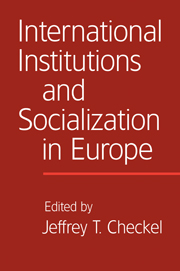Book contents
- Frontmatter
- Contents
- Preface
- Contributors
- Part I International Institutions as Community Builders
- Part II The Socializing Power of European Institutions
- Part III Critique, Conclusions, and Extensions
- 7 Conclusions and Extensions: Toward Mid-Range Theorizing and Beyond Europe
- 8 Getting Socialized to Build Bridges: Constructivism and Rationalism, Europe and the Nation-State
- Index
- References
8 - Getting Socialized to Build Bridges: Constructivism and Rationalism, Europe and the Nation-State
Published online by Cambridge University Press: 06 November 2009
- Frontmatter
- Contents
- Preface
- Contributors
- Part I International Institutions as Community Builders
- Part II The Socializing Power of European Institutions
- Part III Critique, Conclusions, and Extensions
- 7 Conclusions and Extensions: Toward Mid-Range Theorizing and Beyond Europe
- 8 Getting Socialized to Build Bridges: Constructivism and Rationalism, Europe and the Nation-State
- Index
- References
Summary
As a scientific term, the concept of socialization originated more than 100 years ago—in the first issue of the American Journal of Sociology. It later became a central term in sociology through the work of Durkheim, who saw it as the process through which individuals develop from the stage of being driven by instinct to being a sociable human being. Socialization research in general has, since then, been marked by a definitional paradox. The closer the definition gets to the common-sense meaning of socialization—actors internalize norms and standards of behavior by acting in social structures—the more it runs into operational problems. The more operational the definition, the more detached socialization research becomes from its original sociological meaning, and the more it becomes the study of soft power.
This volume revisits the concept and links it to international relations (IR) by focusing on international socialization. It links to debates in IR theory by adopting a definition that allows for both sociological and rationalist accounts of norm adoption: socialization is the process of inducting actors into the norms and rules of a given community. Whereas this definition cannot overcome the general paradox, it is nonetheless open both to the introduction of novices into common standards through the impersonal power of structures, and to the deliberate use of soft means of influence. It thus fosters a dialogue between constructivists and rationalists, specifically over the possibility of building bridges between different theoretical schools.
- Type
- Chapter
- Information
- International Institutions and Socialization in Europe , pp. 241 - 274Publisher: Cambridge University PressPrint publication year: 2007
References
- 2
- Cited by



